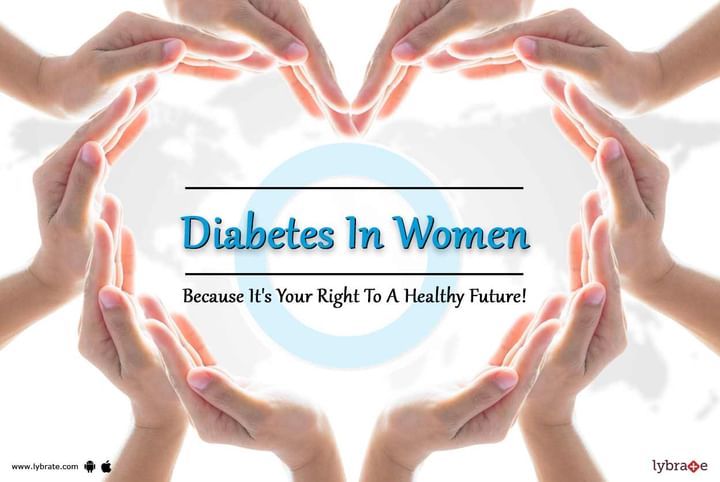Diabetes In Women - Because It's Your Right To A Healthy Future!
The disease itself may not discriminate on the gender basis, but when it comes to healthcare for patients with diabetes, women find themselves at a disadvantage as compared to men. Studies indicate that diabetes, a disease that affects over 371 million people worldwide takes a greater toll on women than men. Though, hormones in women do account for some of the unique challenges they have to face, but there are other societal factors as well that bring in the differences.
This World Diabetes Day is about promoting the significance of affordable care for diabetes and equitable access for all women at risk or living with diabetes to essential medicines, technological information and self-management education they require and achieve an optimal outcome to strengthen their adequacy to prevent type-2 diabetes. Because it's your right to a healthy and disease-free future!
So, how will you know if you are suffering from this deadly disease – Diabetes?
Symptoms
Women with diabetes experience many of the same symptoms as that of men. However, there are some that are specific to women.
Symptoms experienced by both women and men:
-
Increased thirst and hunger
-
Unnecessary weight loss or gain
-
Blurred vision
-
Wounds that heal slowly
-
Breath that has a sweet or fruity odor
-
Irritability
-
Reduced feeling in hands or feet
Symptoms unique to women:
-
Vaginal yeast infections
-
Urinary infections
-
Vaginal thrush
-
Female sexual dysfunction
Diabetes is the ninth leading cause of death in women globally, causing 2.1 million deaths each year. Two out of every five women suffering from diabetes are of reproductive age. Women with diabetes have more difficulty conceiving and may have poor pregnancy outcomes.
Diabetes and Pregnancy
The affect of Diabetes, in a pregnancy, will not be great, if controlled properly. Women with diabetes should talk to their gynaecologists while planning to conceive so that they can control their blood sugar levels even before getting pregnant. Your gynaecologist will help you control and monitor your diabetes and blood sugar levels during pregnancy.
And, if you fail to get your blood sugar levels under control during pregnancy, you may experience severe risks:
-
Premature delivery
-
Difficult delivery or cesarean section (C-section)
-
Having a large baby
-
Preeclampsia (high blood pressure usually with protein in the urine)
-
Low blood glucose in a newborn
-
Breathing problems in the newborn
-
Yellowing skin and eyes (jaundice) in a newborn
-
Worsening diabetic eye problems and kidney problems for the mother
-
Urinary or bladder infections
What is Gestational Diabetes?
When diabetes occurs in women during pregnancy, it is called gestational diabetes. It is usually diagnosed at the first week of pregnancy. Like in type 1 and type 2 diabetes, blood sugar levels become too high. When a woman is pregnant, more glucose is required to nourish the baby developing inside her womb. During this time, the body needs additional insulin, which is produced by the pancreas. In some women, the body does not produce enough insulin to meet this need, and blood sugar levels rise, resulting in gestational diabetes.
Fortunately, for most women, gestational diabetes will go away once the baby is delivered. However, women who have had gestational diabetes are at increased risk of developing type-2 diabetes. Further, people suffering from PTSD are at higher risk and should consult their doctors immediately and those who are presently affected with Diabetes should consult for pre-conception consultation.
Risk Factors for Diabetes in Women
You are at risk for type-2 diabetes if you:
-
are overweight or obese
-
are older than 45
-
have a family history of diabetes (parent or sibling)
-
have had gestational diabetes
-
have had a baby with a birth weight of more than 9 pounds
-
have high blood pressure
-
have high cholesterol
-
have other health conditions that are linked to problems using insulin, such as PCOS
Diabetes Treatment Options
Medications
There are various medications you can take to control the symptoms of diabetes. These include:
-
Insulin therapy
-
Sulfonylureas like chlorpropamide, which increase pancreatic insulin secretion
-
Metformin (Glucophage), which reduces blood sugar
Ayurvedic Treatment
Ayurveda can help to fight with symptoms of diabetes in a planned manner. Ayurveda includes the appropriate eating regimen plan, prescriptions, and different medications, this sickness can be overseen superbly. Consult with the best doctor for ayurvedic treatment for diabetes.
Lifestyle changes
A change in your diet and lifestyle can also help women control their diabetes
-
Exercise and maintain a healthy weight
-
Monitor your blood sugar
-
Eat a diet focused on fruits, vegetables, and whole grains
-
Strictly avoid smoking cigarettes
Alternative remedies
Women with diabetes can try other alternative remedies to treat the symptoms, such as
-
Eat more broccoli, buckwheat, sage, peas, and fenugreek seeds
-
Take supplements like chromium or magnesium
-
Take plant supplements
-
Can wear diabetic socks for women which maintains flow of blood and oxygen in feet.
But, always remember to consult with your doctor before trying any new treatment. Even if they are natural, they can intrude with your on-going treatment or medications. So, this World Diabetes Day, take a pledge towards healthy living, because your health is important to someone else!
In case you have a concern or query you can always consult an expert & get answers to your questions!



+1.svg)
